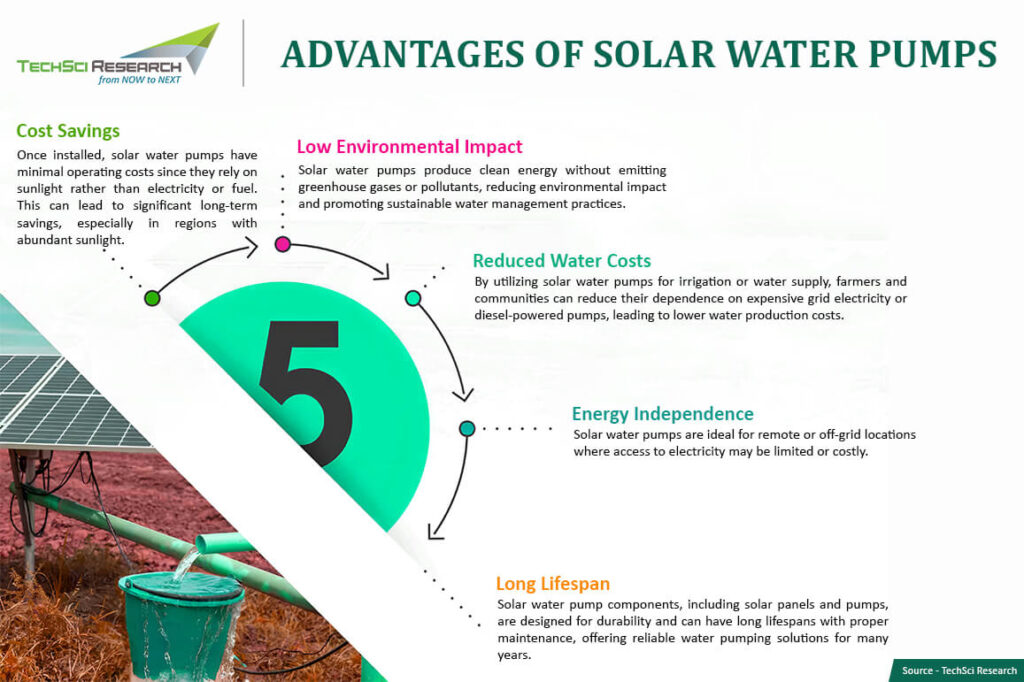Exploring the Global Solar Water Pumps Market
In recent years, the global focus on sustainability and renewable energy has propelled the growth of various eco-friendly technologies. Among these, solar water pumps have emerged as a promising solution for addressing water scarcity issues while reducing dependence on traditional energy sources. This blog delves into the dynamics of the solar water pumps market, examining its growth drivers, challenges, technological advancements, and future prospects.
Understanding Solar Water Pumps:
Solar water pumps utilize photovoltaic panels to convert sunlight into electricity, which powers pumps to extract water from a source such as a well, river, or borehole. Unlike conventional pumps reliant on grid electricity or fossil fuels, solar water pumps offer a clean, sustainable, and cost-effective alternative for irrigation, livestock watering, and community water supply, particularly in remote or off-grid areas.
Solar water pumps offer a range of benefits, but they also come with certain limitations. Here are some pros and cons:
Pros of Solar Water Pumps:

Renewable Energy Source: Solar water pumps harness energy from sunlight, a virtually infinite and renewable resource. This reduces reliance on finite fossil fuels and contributes to mitigating climate change.
Cost Savings: Solar water pumps are a cost-effective solution as once installed, they have minimal operating costs since they rely on sunlight rather than electricity or fuel. This can lead to significant long-term savings, especially in regions with abundant sunlight.
Energy Independence: Solar water pumps are ideal for remote or off-grid locations where access to electricity may be limited or costly. They provide a reliable and sustainable source of energy for water pumping needs, promoting energy independence.
Low Environmental Impact: Solar water pumps produce clean energy without emitting greenhouse gases or pollutants, reducing environmental impact and promoting sustainable water management practices.
Reduced Water Costs: By utilizing solar water pumps for irrigation or water supply, farmers and communities can reduce their dependence on expensive grid electricity or diesel-powered pumps, leading to lower water production costs.
Scalability: Solar water pump systems can be easily scaled to meet varying water demand requirements, making them suitable for small-scale applications like household water supply as well as large-scale irrigation projects.
Long Lifespan: Solar water pump components, including solar panels and pumps, are designed for durability and can have long lifespans with proper maintenance, offering reliable water pumping solutions for many years.
Cons of Solar Water Pumps:
High Initial Cost: The upfront cost of purchasing and installing solar water pump systems can be prohibitive, especially for small-scale farmers or communities with limited financial resources. This can pose a barrier to adoption, particularly in developing countries.
Intermittent Power Supply: Solar water pump performance is dependent on sunlight availability, which can vary depending on weather conditions, time of day, and geographic location. This intermittency can affect pump output and reliability, requiring backup solutions or energy storage systems.
Technical Complexity: Installing and maintaining solar water pump systems requires technical expertise, which may not be readily available in rural or remote areas. Lack of skilled personnel can lead to operational challenges and downtime.
Limited Pumping Capacity: Solar water pumps may have lower pumping capacities compared to conventional pumps powered by grid electricity or diesel engines. This can be a limitation for large-scale irrigation or water supply projects with high water demand.
Space Requirements: Solar water pump systems require adequate space for solar panel installation to capture sunlight efficiently. In areas with limited available land or shading issues, this can pose a challenge to system implementation.
Seasonal Variability: Solar water pump performance may vary seasonally, with reduced output during periods of low sunlight, such as winter or rainy seasons. This can impact water availability for irrigation or other purposes during critical periods.
Dependency on Sunlight: In regions with frequent cloud cover or limited sunlight, solar water pumps may not operate optimally, leading to decreased efficiency and water pumping capacity.
While solar water pumps offer numerous advantages, it’s essential to consider the specific needs, conditions, and constraints of each application to determine whether they are the most suitable solution. Despite certain limitations, ongoing technological advancements and supportive policies continue to enhance the viability and effectiveness of solar water pump systems in addressing water pumping needs sustainably.
Market Landscape:
The global solar water pumps market has witnessed significant expansion in recent years, driven by increasing awareness of environmental issues, government initiatives to promote renewable energy adoption, and technological advancements in solar PV technology. According to TechSci Research report “Solar Water Pumps Market– Global Industry Size, Share, Trends, Opportunity, and Forecast, Segmented By Type (Submersible & Surface), By Operation (AC Pumps, DC Pumps), By Capacity (Below 5HP; 5HP; 5-8 HP & Above 8HP), By Application (Irrigation, Drinking Water, Industrial & Others), By Region, Competition, 2018-2028,” the Global Solar Water Pumps Market was valued at USD 3.84 billion in 2022 and is anticipated to project robust growth in the forecast period with a CAGR of 9.57% through 2028. The government’s increasing investments in efforts to reduce the dependence on fossil fuels and lower greenhouse gas emissions have contributed to the increased demand for solar water pumps.
Key Drivers:
Environmental Concerns: Growing concerns about climate change and environmental degradation have prompted governments, businesses, and communities to seek sustainable alternatives to traditional water pumping methods.
Energy Access: Solar water pumps play a crucial role in providing access to clean water for irrigation, drinking, and sanitation in remote or rural areas with limited access to grid electricity.
Cost Savings: While the initial investment in solar water pumps may be higher than conventional pumps, the long-term operational cost savings, including reduced fuel and maintenance expenses, make them economically viable, especially in regions with abundant sunlight.
Government Incentives: Many governments offer subsidies, tax incentives, and favorable policies to promote the adoption of renewable energy technologies, including solar water pumps, further driving market growth.
Challenges:
Despite the promising prospects, the solar water pumps market faces several challenges that could impede its widespread adoption:
Initial Cost: The upfront cost of solar water pump systems can be a barrier for small-scale farmers or communities with limited financial resources, hindering widespread adoption, particularly in developing countries.
Technical Complexity: Installing and maintaining solar water pump systems require technical expertise, which may not be readily available in rural or remote areas, leading to operational challenges and system downtime.
Intermittent Sunlight: Solar water pump performance is contingent upon sunlight availability, making them less reliable during periods of inclement weather or low solar radiation, necessitating backup solutions or energy storage systems.
Lack of Awareness: Limited awareness about the benefits and availability of solar water pumps among end-users, especially in rural areas, poses a challenge to market expansion and adoption.
Technological Advancements:
Innovations in solar PV technology, coupled with advancements in pump design and efficiency, are driving improvements in solar water pump systems:
Efficiency Enhancements: Manufacturers are developing more efficient solar panels and pump components to optimize energy conversion and water delivery, maximizing system performance even in challenging conditions.
Remote Monitoring and Control: Integration of IoT (Internet of Things) and sensor technologies enables remote monitoring, diagnostics, and control of solar water pump systems, facilitating predictive maintenance and troubleshooting.
Hybrid Solutions: Hybrid solar water pump systems that combine solar energy with other renewable energy sources or grid electricity are gaining traction, offering increased reliability and flexibility in operation.
Future Outlook:
The future of the solar water pumps market looks promising, driven by ongoing technological innovation, supportive government policies, and increasing awareness of environmental sustainability. Key trends shaping the market include:
Rural Electrification: Solar water pumps will play a pivotal role in rural electrification efforts, providing clean water access and supporting agricultural productivity in off-grid and underserved communities.
Smart Water Management: Integration of smart water management solutions with solar water pump systems will enhance efficiency, optimize water usage, and minimize environmental impact, contributing to sustainable agriculture and water conservation.
Market Expansion: Continued cost reductions, improved product availability, and awareness-building initiatives will drive market expansion, particularly in emerging economies with significant agriculture sectors and high solar potential.
Top 10 Companies in the Global Solar Water Pumps Market:
1.Alpex Solar Pumps
Alpex Solar Pumps is a leading manufacturer and supplier of solar water pumps, renowned for its cutting-edge technology and high-quality products. With a focus on reliability and efficiency, Alpex offers a diverse range of solar pump solutions tailored to meet the needs of agriculture, irrigation, and rural water supply projects. The company’s Solar AC/DC pumps are used in various applications, including agricultural irrigation, livestock watering, domestic water supply, community water projects and in remote or off-grid locations. The company has successfully deployed over 10,000 water pumps across India, with installations ongoing. Alpex provides a comprehensive range of water pumps, including both AC and DC variants, available in surface and submersible categories. These pumps are integrated with top-tier Alpex Solar Modules, ensuring high quality and reliability.
Alpex Solar has successfully supplied and installed pumps under RHDS, RACP, PEDA, HAREDA, CREDA schemes.
2. Aqua Group
Aqua Group is a pioneer in the solar water pump industry, known for its innovative approach and commitment to sustainability. It is the largest manufacturer of high performance bore well submersible pumps in India. With a wide range of solar-powered pumping solutions, Aqua Group caters to diverse applications, including agriculture, horticulture, and industrial water supply, delivering reliable performance and long-term durability. AQUA GROUP operates within the market offering a diverse array of products under the renowned brand name “TEXMO”. Its product range encompasses Borewell Submersible pumps, Monoblocks, Self-Priming pumps, and Jet pumps.
3. Bright Solar Limited
Bright Solar is a leading manufacturer of solar-powered water pumping systems. The company stands out for its extensive experience and expertise in designing and manufacturing solar water pump systems. Committed to delivering superior quality and performance, Bright Solar offers customizable solutions to address the unique requirements of customers across residential, commercial, and agricultural sectors. The company’s products have been designed specifically to meet out the needs of environment by a team dedicated towards solar products. For over half a decade, its skilled and dependable staff has proved repeatedly the top-notch quality and stringent punctuality it maintains while manufacturing the products.
4.C.R.I. Pumps Private Limited
C.R.I. Pumps Private Limited is a trusted name in the solar water pump industry, renowned for its robust and energy-efficient pump solutions. With a focus on innovation and sustainability, C.R.I. Pumps offers a comprehensive range of solar pump systems designed to maximize water delivery while minimizing energy consumption. C.R.I. provides an extensive array of Next Gen products tailored for specialized applications. Its offerings encompass Intelligence Smart Mini pumps i-Smart, boasting 5-in-1 features. Additionally, it offers Sewage and Drainage Pumps designed for wastewater applications, Pressure Boosters ensuring consistent water pressure within residences, Swimming Pool Pumps dedicated to pool water cleaning and recycling, and Circulatory Pumps engineered for domestic hot and cold-water circulation with optimal pressure. These pump solutions are available as combo packages to cater to customized requirements, meticulously crafted to deliver hassle-free performance.
5.Crompton
Crompton is a leading player in the renewable energy sector, offering a wide array of solar water pump solutions designed for reliability and performance. With a strong emphasis on technological advancement and customer satisfaction, Crompton’s solar pumps are widely used in agriculture, domestic water supply, and industrial applications. Crompton pumps serve as versatile solutions, adept at enhancing water supply in residential settings, facilitating irrigation in agricultural fields, and powering industrial processes. The company’s pumps have high suction capacity, wide voltage operation, and easy to maintain.
6. Lorentz
Lorentz has established itself as a global leader in solar water pumping technology, providing innovative and efficient solutions for various water pumping needs. With a focus on sustainability and durability, Lorentz’s solar pumps are widely recognized for their reliability, low maintenance requirements, and long service life. Established in Germany in 1993, Lorentz has been a trailblazer, innovator, and leader in engineering and manufacturing solar-powered water pumping solutions. The company is renowned for its extensive expertise in designing, developing, and producing the most diverse range of solar pumps in the industry. Lorentz solar water pumps are designed to cater to three primary application areas, such as providing drinking water for both people and livestock, facilitating swimming pool circulation and filtration, known as Responsible Leisure, and supporting irrigation needs for smallholdings, large commercial farms, etc.
7. Dankoff Solar
Dankoff Solar is a reputable manufacturer of solar water pumps, offering a diverse range of products tailored to meet the needs of off-grid and remote applications. With a commitment to quality and performance, Dankoff Solar’s pumps are trusted for their efficiency, durability, and ease of installation. Dankoff Solar boasts the production of the most efficient surface pumps in the industry. Its comprehensive pump line offers solutions with a remarkable life expectancy of 15-20 years, ensuring durability and reliability. Whether it’s the requirement to push water through extensive pipelines, extract up to 50,000 gallons (200 m3) per day from shallow sources, deliver city water pressure to remote locations, or facilitate garden irrigation, Dankoff has a solution tailored to diverse needs.
Engineered to consume approximately 65% less energy compared to conventional grid-powered pumps; Dankoff Solar Pumps can operate directly from solar panels. Moreover, when controlled by the Dankoff DC Controller, they can yield up to 30% more output per day. Additionally, its DC Controller facilitates battery charging and regulation, enabling seamless operation for systems requiring 24-hour functionality.
8.Duke Plasto Technique Private Limited
Duke Plasto Technique Private Limited specializes in the design and manufacturing of solar water pump systems, catering to agricultural, domestic, and industrial water pumping requirements. With a focus on innovation and customer satisfaction, Duke Plasto Technique’s pumps are known for their reliability, efficiency, and cost-effectiveness. The company has more than 34 years of experience and has presence in more than 40 countries. It has 1500+ channel partners.
9. EcoSoach
EcoSoach is a leading provider of solar water pump solutions, dedicated to promoting sustainable agriculture and water management practices. With a focus on affordability and performance, EcoSoach offers a wide range of solar pumps designed to enhance productivity, reduce energy costs, and conserve water resources.
10. Ecozen Solutions
Ecozen Solutions is at the forefront of innovation in the solar water pump industry, offering advanced technology solutions for agriculture and rural water supply. With a focus on smart and sustainable solutions, Ecozen Solutions’ solar pumps are equipped with features such as remote monitoring, energy optimization, and predictive maintenance, enabling efficient and hassle-free operation.
Thus, these top 10 solar water pump companies exemplify excellence in innovation, reliability, and sustainability, driving the adoption of renewable energy solutions and empowering communities worldwide to harness the power of the sun for water pumping needs. With their commitment to quality and customer satisfaction, these companies are leading the way towards a greener and more sustainable future.
According to TechSci Research report “India Solar Water Pump Market By Type (Submersible Pump, Surface Pump), By Operation (AC Pump and DC Pump), By Capacity (Upto 5 HP, 5 HP to 10 HP, 10 HP to 20 HP, More than 20 HP), By Application (Agriculture, Water Treatment, Others), By Region, Competition Forecast & Opportunities, 2018-2028,” the India Solar Water Pump Market is expected to register robust growth during the forecast period, 2024-2028. The market growth is driven by various factors, such as government initiatives and policies, rising energy demand, farmers’ awareness and acceptance, and others.
Key Factors Driving the Growth of India Solar Water Pump Market:
Government Initiatives and Policies: The Government of India has introduced various initiatives and policies to promote renewable energy adoption, including solar water pumps. Schemes such as the Pradhan Mantri Kisan Urja Suraksha evam Utthaan Mahabhiyan (PM-KUSUM) aim to incentivize farmers to adopt solar-powered irrigation systems by providing subsidies and financial support for installation.
Rising Energy Demand: India’s growing population and increasing agricultural activities have led to a rise in energy demand, particularly for water pumping in agriculture. Solar water pumps offer a sustainable and cost-effective solution to meet this demand while reducing dependence on conventional energy sources.
Farmers’ Awareness and Acceptance: With increasing awareness about environmental sustainability and the benefits of renewable energy, farmers in India are increasingly recognizing the advantages of solar water pumps. These pumps offer a reliable and efficient alternative to diesel or grid-powered pumps, helping farmers reduce operational costs and improve productivity.
Declining Solar PV Costs: The decreasing costs of solar photovoltaic (PV) technology have made solar water pumps more affordable and economically viable for farmers in India. As the cost of solar panels continues to decline, the overall cost of solar water pump systems is becoming more competitive compared to traditional pumping solutions.
Water Scarcity and Irrigation Needs: India faces water scarcity challenges, particularly in rural and agricultural regions. Solar water pumps enable farmers to access water from various sources such as borewells, rivers, or ponds for irrigation purposes, thus improving crop yields and addressing water scarcity issues.
Remote and Off-Grid Applications: Many rural areas in India lack access to reliable grid electricity, making it challenging to power water pumps for irrigation. Solar water pumps offer an off-grid and decentralized solution to meet water pumping needs in remote or underserved areas where grid connectivity is limited or unreliable.
Environmental Sustainability: The emphasis on environmental sustainability and reducing carbon emissions is driving the adoption of renewable energy technologies like solar water pumps. By switching to solar-powered irrigation, farmers can reduce their carbon footprint and contribute to mitigating climate change.
Technological Advancements: Advancements in solar PV technology, as well as improvements in pump design and efficiency, are making solar water pumps more reliable, efficient, and durable. Enhanced product performance and reliability are boosting confidence in solar water pump systems among Indian farmers.
Conclusion:
The solar water pumps market not only addresses water scarcity challenges but also serves as a catalyst for advancing sustainable development goals on a global scale. As technological innovations continue to evolve and governments implement supportive policies, coupled with growing public awareness, solar water pumps are increasingly recognized as integral solutions for promoting energy access, enhancing agricultural productivity, and ensuring water security. This convergence of factors positions solar water pumps to play a pivotal role in driving positive socio-economic and environmental outcomes worldwide.
As the world embraces renewable energy solutions, solar water pumps emerge as a shining example of harnessing the abundant and clean power of the sun to meet essential water needs sustainably. Their versatility, efficiency, and reliability make them indispensable tools for communities, farmers, and industries striving to achieve resilience in the face of water challenges while reducing reliance on fossil fuels and mitigating environmental impacts. Thus, the adoption of solar water pumps not only addresses immediate water needs but also contributes significantly to building a more sustainable and equitable future for generations to come.



